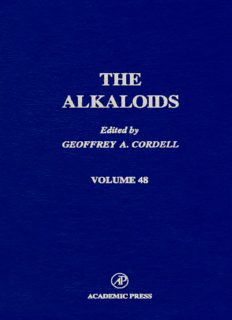
The Alkaloids: Chemistry and Pharmacology 48 PDF
Preview The Alkaloids: Chemistry and Pharmacology 48
THE ALKALOIDS Chemistry and Pharmacology VOLUME 48 This Page Intentionally Left Blank THE ALKALOIDS Chemistry and Pharmacology Edited by Geoffrey A. Cordell College of Pharmacy University of Illinois at Chicago Chicago, Illinois VOLUME 48 ACADEMIC PRESS San Diego New York Boston London Sydney Tokyo Toronto This book is printed on acid-free paper. @ Copyright 0 1996 by ACADEMIC PRESS, INC. All Rights Reserved. No part of this publication may be reproduced or transmitted in any form or by any means, electronic or mechanical, including photocopy, recording, or any information storage and retrieval system, without permission in writing from the publisher. Academic Press, Inc. A Division of Harcourt Brace & Company 525 B Street, Suite 1900, San Diego, California 92101-4495 United Kingdom Edition published by Academic Press Limited 24-28 Oval Road. London NWI 7DX International Standard Serial Number: 0099-9598 International Standard Book Number: 0-12 -469548-5 PRINTED IN THE UNITED STATES OF AMERICA 96 97 9899 00 01 BB 9 8 7 6 5 4 3 2 1 CONTENTS CONTRIBUTO.R..S... ................................................................... vii PREFAC.E.. ............................................................................ ix Chapter 1. Alkaloids from the Medicinal Plants of New Caledonia THIERRSBYV ENEATN D JACQUEPSU SSET I. Introduction .................................................................. 1 11. Gymnosperms ................... 3 111. Angiosperms .................................................................. 4 IV. Conclusion ............................................ ............. 65 References 66 Chapter 2. The Strychnos Alkaloids JOANB OSCHJ, OSEPB ONJOCHAN, D MERCEDEASM AT I. Introduction and Scope ...................................................... 75 11. Occurrence and Structures.. ................................................. 77 111. Synthesis ...................................................................... 86 References .................................................................... 181 Chapter 3. Aristotelia Alkaloids HANS-JURGB ORSCHBERG I. ..... ....... 192 11. ................................. 193 111. Tetracyclic Alkaloids. ........................................................ 194 IV. Pentacyclic Alkaloids ................ 210 V. Hexacyclic and Dimeric s ................................ 236 VI. Biogenesis .................................................................... 238 VII. Taxonomy ................ 244 VIII. Pharmacology. ...................................................... 244 References .................................................................... 246 V vi CONTENTS . Chapter 4 Erythrina and Related Alkaloids YOSHWKET SUDAA ND TAKEHISRAON O I . Introduction ............ .................................. 249 I1. Occurrence. Detection. and Isolation ....................................... 252 I11 . Biosynthesis. .................................................................. 266 IV . Structure Determination ........... 269 V . Pharmacology. ................................................................ 292 VI . Synthesis ...................................................................... 294 VII . Summary ......... ......................................................... 332 References .................................................................... 333 CUMULATIINVDEE XO F TITLE..S. ..................................................... 339 INDEX ................................................................................. 347 CONTRIBUTORS Numbers in parentheses indicate the pages on which the authors’ contributions begin. MERCEDEASM AT(7 59, Laboratory of Organic Chemistry, Faculty of Phar- macy, University of Barcelona, 08028 Barcelona, Spain JOSEP BONJOC(H7. 9, Laboratory of Organic Chemistry, Faculty of Phar- macy, University of Barcelona, 08028 Barcelona, Spain HANS-JURBGO RSCHBE(R1G91 ), Laboratorium fur Organische Chemie der ETH Zurich, CH-8092 Zurich, Switzerland JOANB OSCH(7 5), Laboratory of Organic Chemistry, Faculty of Pharmacy, University of Barcelona, 08028 Barcelona, Spain JACQUPEUSS SET(l ), Institut de Chimie des Substances Naturelles, Centre National de la Recherche Scientifique, 91198 Gif-sur-Yvette, France TAKEHIRSOA NO (249), Showa College of Pharmaceutical Sciences, Machida-shi, Tokyo, Japan THIERRSYB VENE(Tl) , Institut de Chimie des Substances Naturelles, Cen- tre National de la Recherche Scientifique, 91198 Gif-sur-Yvette, France YOSHISUKTES UDA(2 49), Faculty of Pharmaceutical Sciences, Kanazawa University, Kanazawa, Japan vii This Page Intentionally Left Blank PREFACE Frequently in this series, alkaloids are grouped together for discussion by their structural class or their natural source. In Chapter 1, however, SCvenet and Pusset summarize the results from an alkaloid perspective of exceptional effort begun almost thirty years ago to investigate the flora, much of it endemic, of the French territory of New Caledonia. This chapter, organized taxonomically, describes the numerous new and important alka- loid structural types that have been discovered as a result of this effort. In Chapter 2, Bosch, Bonjoch, and Amat describe the substantial progress that has been made on the chemistry of the Strychnos alkaloids during the past seven years. Many additional alkaloids have been isolated and characterized, thereby adding to the breadth of structural innovation in the series. These data are fully tabulated here. More remarkable, however, is the intense interest that has developed for many synthetic chemistry groups in both the stereo- and enantioselective synthesis of these alkaloids, the latter an area that had remained largely unexplored for over 40 years. The Aristotelia alkaloids are composed of a cyclic monoterpene unit attached to a tryptamine moiety. With the continuing phytochemical exami- nation of the various Aristotelia species and the increased attention to the chemical acrobatics within the group, coupled with the expanded efforts toward the total synthesis of these metabolites, there is a substantial amount of recently published work, which has been elegantly reviewed by Borsch- berg. Finally, Tsuda and Sano review the erythrinan and homoerythrinan alka- loids, an area of alkaloid chemistry which has not been reviewed here for seventeen years. These alkaloid groups have expanded rapidly in the past few years, with many new related alkaloid types delineated. However, the most dramatic progress has been made in the synthesis of the broad struc- tural diversity of these alkaloids. Interest in these alkaloid groups continues even though they have not been subjected to extensive biological evaluation. Geoffrey A. Cordell University of Illinois at Chicago ix
